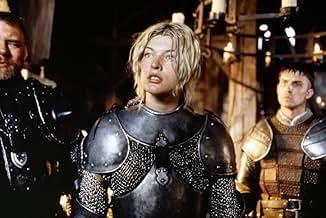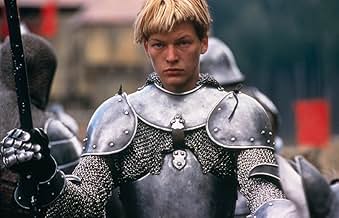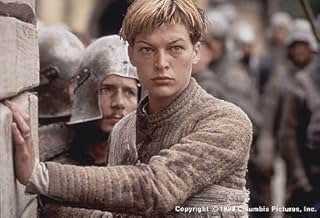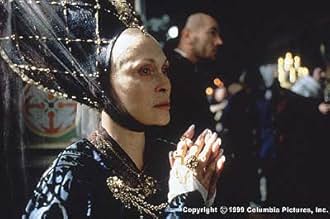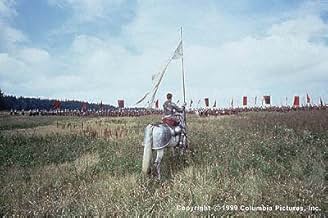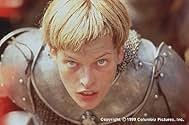Une jeune fille a une vision qui la pousse à bouter les forces occupantes hors de France.Une jeune fille a une vision qui la pousse à bouter les forces occupantes hors de France.Une jeune fille a une vision qui la pousse à bouter les forces occupantes hors de France.
- Prix
- 5 victoires et 13 nominations au total
- Look Out
- (as Stephane Algoud)
Histoire
Le saviez-vous
- AnecdotesMost of the characters, including Joan's Captains, were real people. Giles de Rais was a real person who, after the war and Joan's death, retired to his lands. Many years later, he was arrested for the murder of more than 100 young boys, and executed. Some historians believe that his crimes were the basis for the French fairy tale "Bluebeard," about a rich man who murders his wives and hides their bodies in his grand house.
- GaffesJoan's older sister was not murdered by soldiers, but survived to adulthood and married. She died ultimately in childbirth.
- Citations
Joan of Arc: I've always been faithful to God and I've followed everything He's ever said and I've done everything He's ever asked me to do.
The Conscience: God asked you to do something?
Joan of Arc: Yes. Yes, lots of things.
The Conscience: You mean God said, "I need you, Jeanne."
Joan of Arc: No. But He sent me signs.
The Conscience: Signs? What signs?
Joan of Arc: The wind. The wind. And the clouds, ringing!
The Conscience: Ringing clouds?
Joan of Arc: The dance. The dance. The dance. The dance.
The Conscience: The dance.
Joan of Arc: The sword! The sword lying in the field. That was a sign.
The Conscience: No. That was a sword in a field.
Joan of Arc: No. No, that was a sign!
The Conscience: No. That was a sword. In a field.
Joan of Arc: It can't just get there by itself! It can't. A sword just doesn't get there by itself. It can't just get there by itself.
The Conscience: True. Every event has an infinite number of causes, so why pick one rather than another? There are many ways a sword might find itself in a field.
- Autres versionsThe European release was 10 minutes longer than the US theatrical version, which omits, among others, the scene where Joan's virginity is tested before the court of King Charles VII. The longer version has been released in the USA on DVD.
- Bandes originalesMy Heart Calling
Lyrics and Music by Éric Serra and Achinoam Nini
Produced by Éric Serra
Performed by Achinoam Nini
With the Special Authorization of Interscope/Geffen
Joan was, of course, the deeply devout, illiterate peasant girl who, spurred on by what she claimed were visions and voices sent directly by God - assuring her and France of a glorious victory over the advancing forces of the invading English army - managed to convince a desperate monarch to have her lead an army into the field, despite the fact that she brought with her no previous battle experience or even a rudimentary knowledge of the use of weapons in combat. We first see her as a young girl, strangely obsessed with religious piety, attending confession daily, running through the woods in a mad frenzy of ecstasy, encountering strange, inexplicable visions along the way, and, eventually, being driven to an intense hatred of the British by the rape and murder of her beloved older sister. We see the French royalty, so driven to desperation by the seemingly inexorable encroachment of the brutal British onto their native soil, that they lend credence to this child and give in to her demands, sending her out to lead the troops into what turns out to be some truly miraculous routs and victories. But glory is, more often than not, an ineffable entity that is lost as quickly as it is gained and Joan learns tragically that, once her original goal of restoring the French monarch to his throne is achieved, her services are no longer of value, and she is allowed to be captured by the English, tried by the Catholic Church, and burned at the stake by the English government for the crime of witchcraft.
Given this fascinating and astonishing series of events, it would be difficult to make a film completely lacking in interest and insight. And, indeed, `The Messenger' is, perhaps, a better film than many of the harsh, almost bitter reviews by many critics would indicate. The first half of the film is a rather conventional telling of the tale. The warrior Joan often comes across as a shrill, petulant adolescent who somehow never convinces us that she is, indeed, someone all these military strategists would follow. But, about midway through the film, the screenwriters, Andrew Birkin and writer/director Besson, begin to apply some psychological depth to the character. After a particularly sanguine encounter with the English, in which hundreds of decapitated and limbless corpses strew the blood-soaked ground, Joan breaks down in despair over the horrifying inhumanity of the sight. From then on, her actions arise from a paradoxical conflict occurring within the very core of her being - between the righteousness of her pious cause, the pacifistic teachings of Christ and her single-minded devotion to her king and country. When she is finally captured and held in prison before and during her trial, she begins to question the veracity of her visions and to ponder whether the motivation for her cause really lay in divine inspiration or an obsession for personal glory and power. We're a long way from the astute psychological insights of Carl Dreyer's classic silent film version of the story, `The Passion of Jeanne d'Arc,' but `The Messenger' does take occasional time out from its action sequences to attempt to explore the question of whether Joan's miracles were the product of divine intervention or of mere happenstance and chance coupled with a determination and passion borne of insanity. Unfortunately, casting Dustin Hoffman as the Voice of Conscience who visits her in her cell and speaks for the side of reason as she descends more and more into seeming madness, renders much of this otherwise fascinating section faintly ludicrous. Every time his overly familiar face and voice arrive on the scene, we are immediately thrust out of the context of the story and find ourselves tempted to giggle out loud hardly the tone one wants to establish as Joan of Arc marches grimly to the stake. Also, much of what he utters rings false in the context of the film's era; he sounds like he is mouthing psychobabble that would not arrive on the scene for at least another five hundred years.
In terms of dialogue, historical films have always it seems had to face an inevitable Hobson's Choice: should the writers employ language that reflects the reality of the time, thereby making the characters sound stilted or dated by today's standards, or should the authors resort to the use of more modern vernacular, enhancing the immediacy of the story, perhaps, but also possibly creating an uncomfortable and awkward sense of anachronism that weakens the verisimilitude of the film so painstakingly established by the elaborate set decoration and costume design of the film? The writers of `The Messenger' have, for the most part, taken the latter course, leading to mood-shattering declarations by the characters such as `she's nuts!' and `I'm gonna kill that f------ bitch' along with a barrage of four-letter word expletives with which no contemporary PG-13 or R-rated feature could ever do without.
Those with a queasiness when it comes to movie violence had best be forewarned: the battle scenes, though expertly shot and edited, register high on the bloodletting scale.
Of the performers, none matches in quality the exquisite photography, art direction or costume design that adorn the film. Milla Jovovich is, at best, adequate as Joan, rarely giving more than a surface interpretation of the complex psychological struggles occurring at the root of her personality. John Malkovich, as the would-be French king, for whose throne Joan lays her life on the line, has his moments, but the part is not really big enough in the context of the film to allow him to create a multifaceted performance. Faye Dunaway brings a cool, subtle intensity to her role as the future king's manipulative mother-in-law.
`The Messenger' emerges as an ultimately unsatisfying mixture of faults and virtues, yet, because it has such a fascinating story to tell, the film is far more interesting than the brutally hostile reviews that greeted the work's initial release would lead one to believe.
- Buddy-51
- 4 août 2000
- Lien permanent
Meilleurs choix
- How long is The Messenger: The Story of Joan of Arc?Propulsé par Alexa
Détails
- Date de sortie
- Pays d’origine
- Langues
- Aussi connu sous le nom de
- The Messenger: The Story of Joan of Arc
- Lieux de tournage
- Bruntal, République tchèque(Fort of the Tourelles)
- sociétés de production
- Consultez plus de crédits d'entreprise sur IMDbPro
Box-office
- Budget
- 85 000 000 $ US (estimation)
- Brut – États-Unis et Canada
- 14 276 317 $ US
- Fin de semaine d'ouverture – États-Unis et Canada
- 6 360 968 $ US
- 14 nov. 1999
- Brut – à l'échelle mondiale
- 66 976 317 $ US
- Durée2 heures 38 minutes
- Couleur
- Mixage
- Rapport de forme
- 2.39 : 1
Contribuer à cette page




